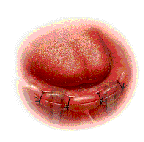Dental Implants are artificial tooth roots. Holes are made into the jaw bones and the artificial roots are placed and covered over. The implants then heal and integrate with the jaw. After healing an artificial top (crown) is placed into the implant and crowns, bridges and attachments for dentures can be placed. Simply stated, a dental implant establishes a foundation for a tooth or teeth to be affixed to where previously there was none. The term "root form implant" refers to a titanium cylinder that is surgically placed into bone. Root form dental implants have become widely used and accepted for the past 10 years. There are several types of implant systems, for our purposes and ease of understanding, this section will deal with the root form implant. It is important to understand some general dental terms, otherwise you may not appreciate the information to its fullest. (Click here for terminology) When an individual has lost all of their teeth, usually a denture can be made. Over the years, the bone that supports the denture may wear down to such a degree that it can no longer support the denture. Most long term denture wearers will ultimately use adhesives to stabilize their denture. However, they will have still lost 40-80% of their chewing ability. Dental implants provide a stable foundation for the fully edentulous patient to regain nearly 90% of their chewing ability, never having to experience a limited diet or the embarrassment of an ill-fitting denture.  Experience
and competency are critical when working with a dentist or oral surgeon.
Implants are more expensive to receive than are other traditional forms
of conventional dentistry, but the rewards may far outweigh the financial
costs. It is essential that implants be given proper
care or they can be lost by the same type bone loss as natural teeth.
X [IMPLANT MAINTENANCE] [QUESTIONS AND ANSWERS] [ADDITIONAL INFORMATION] Implant Information Menu | Denture Menu | Dental information Menu |
